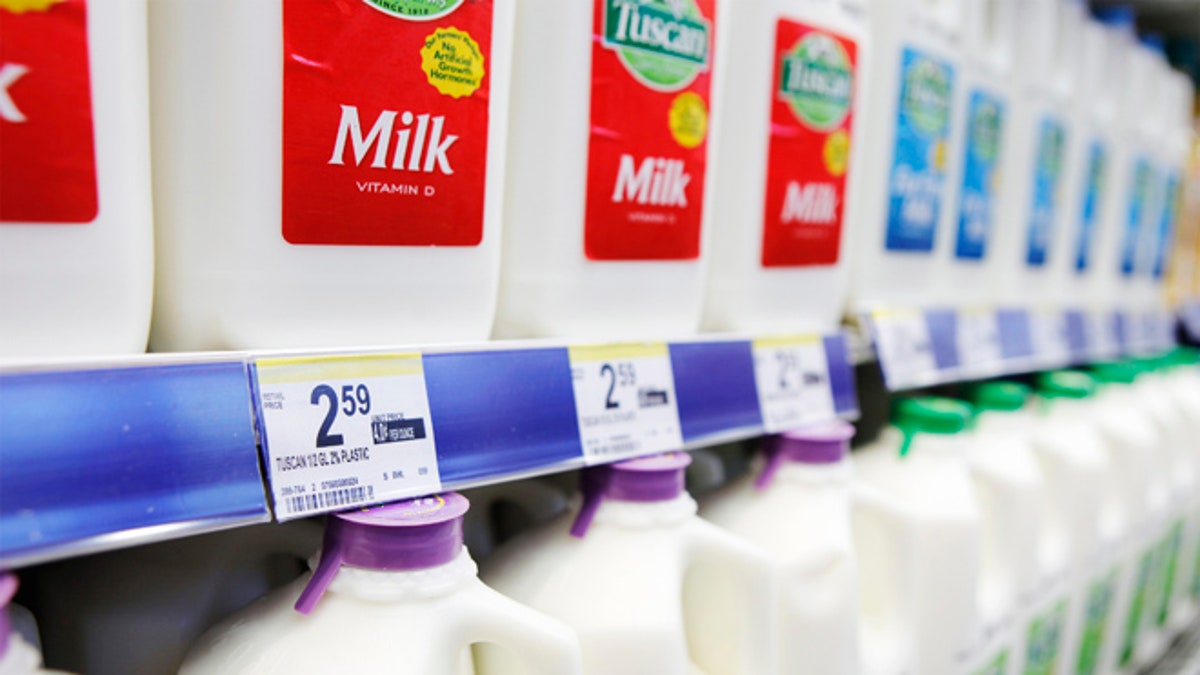
Price labels of half gallons of milk for sale are seen in a store in New York April 7, 2011. (Reuters)
Congress is at another impasse, and this time the price of milk is on the line.
Without an agreement on a hard-fought farm bill -- or at least a short-term fix -- by the end of the year, an antiquated law governing how much dairy producers get paid is scheduled to go into effect. And if lawmakers tumble over what's being called the "dairy cliff," shoppers could see the price of milk skyrocket.
Congressional leaders on Thursday indicated they're trying to strike an agreement, but are working on a Plan B in case they're too far apart to pass a comprehensive bill.
"I've not seen any real progress on the farm bill," a not-so-optimistic House Speaker John Boehner declared Thursday.
The speaker said that if the situation does not change, Congress should just pass a one-month extension of the farm bill, which covers farm subsidies as well as food stamps.
Fox News has learned that an even narrower plan is on the table. Sources said that the House may try to move a short-term measure next week that only deals with the dairy issue -- in a sign of how worried lawmakers are that an impasse could directly hit Americans' wallets.
Though the farm bill deals with a host of complicated and contentious items, milk prices are tied into it because, without a new bill, farm policy would revert back to a 1949 bill that mandated higher prices be paid by the government to dairy producers.
If this happens, it could set off a chain of events that results in higher prices not just for the government, but ordinary shoppers. By raising the price the government pays for dairy products, it could prompt producers to sell to the government instead of in commercial markets -- decreasing the supply and raising prices as a result.
Prices wouldn't go up immediately, as the Agriculture Department would have to write the new rules based on the old laws and then put them into place. But Agriculture Secretary Tom Vilsack is warning that it may not take that long, saying USDA was prepared to implement the dairy law in "short order" if current law expires.
"But boy, I tell you, that's not something that I want to do," Vilsack said.
Some have warned that the price of a gallon of milk could shoot up to $7 or more.
For lawmakers, the milk issue is not what's controversial. Instead, they continue to be at odds over the thornier issues of food stamps and farm subsidies. The two chambers have been far apart on both issues for more than two years.
Despite Boehner's comments, the leaders of the House and Senate Agriculture Committees expressed optimism after a private meeting Wednesday that they may be able to find resolution in time to narrowly avert the expiration of dairy subsidies on Jan. 1.
Finding a compromise on cuts to the nation's $80 billion-a-year food stamp program has been the toughest obstacle. The House passed a bill this summer that would cut $4 billion annually and create new work requirements for some recipients. The Democratic Senate, backed by President Obama, passed a farm bill with $400 million annual cut, or a tenth of the House cut.
But the Senate has come back with a bill that would cut twice as much as their prior bill.
Negotiators are also working out how farm subsidies should be restructured in the absence of a traditional subsidy called direct payments, which are paid to farmer regardless of crop price or crop yield. Both chambers' bills would eliminate this $5 billion annual subsidy in response to critics who say it pays farmers not to farm. But they have argued over how to replace those payments, with major farm groups squabbling over whether subsidies should kick in based on crop prices or farmer revenue, and how to count the acreage on which the subsidies are based.
The debate over the farm bill coincides with frantic negotiations over the budget, with lawmakers facing a Jan. 15 deadline to pass a new bill or trigger another partial government shutdown.
House leaders have set Dec. 13 as the last day for votes this year, and getting a bill in shape by then -- particularly one with the votes to pass -- could be difficult.
Fox News' Chad Pergram and The Associated Press contributed to this report.




